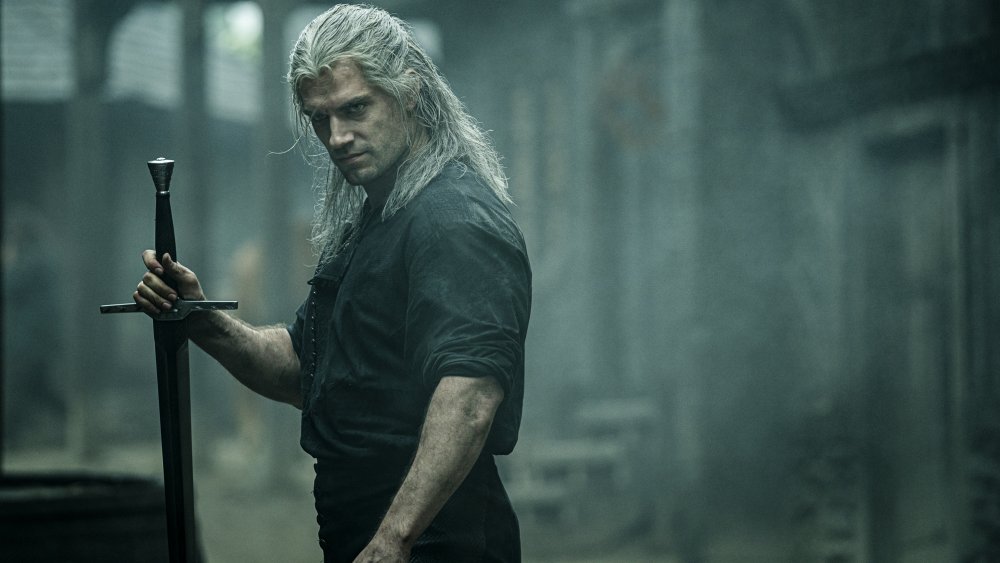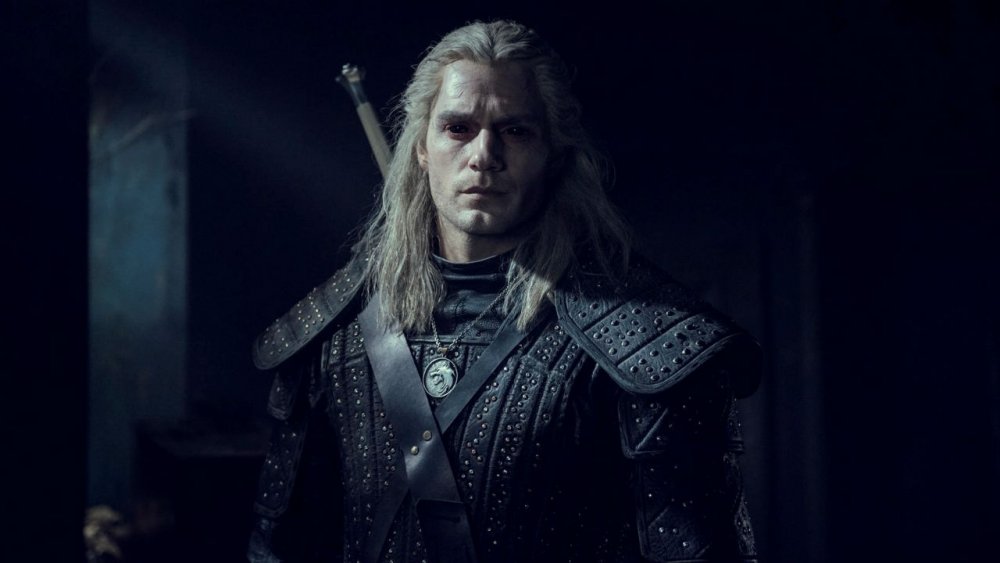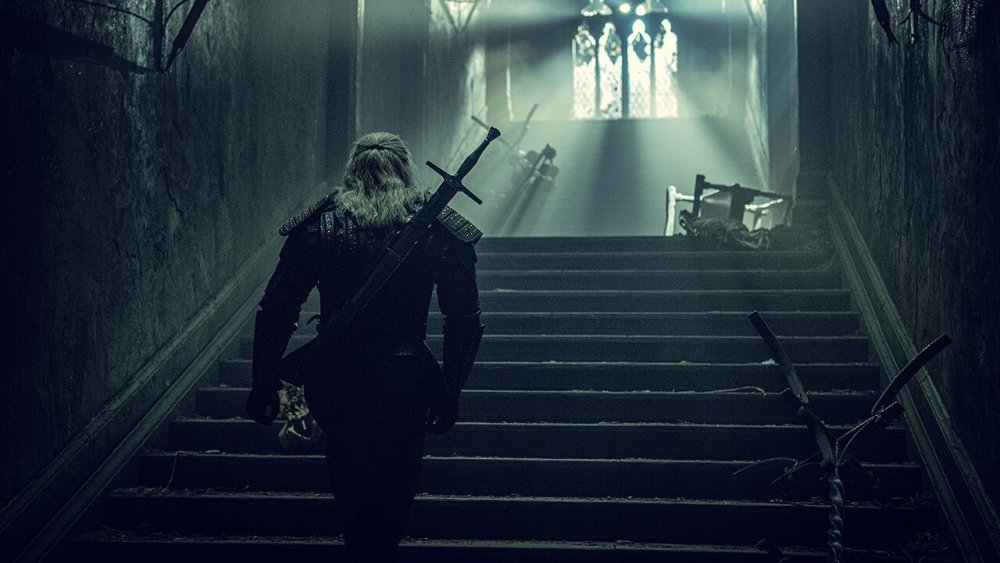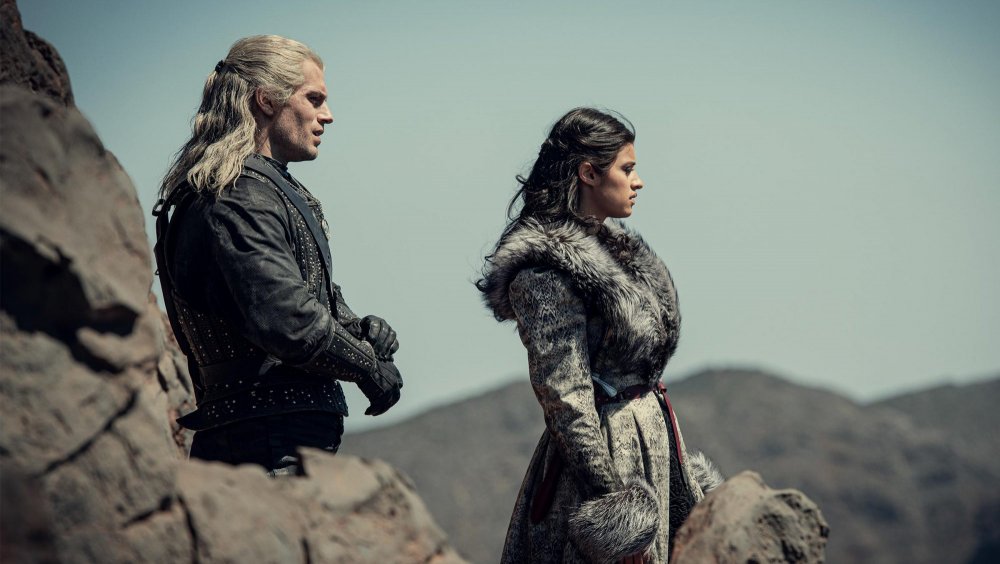The Real Reason Henry Cavill Doesn't Talk Much On The Witcher
Adapting a fictional work across mediums can often mean changing facets of the original canon — sometimes for better, sometimes not. Changes, irrespective of execution quality, are sometimes necessary for the different benefits and drawbacks the new medium presents in adaptation. This tension is usually the source for "the book was better than the movie" arguments, but when executed well, it can give new perspective to even the most worn of texts, bringing new life and value to the narrative.
Netflix's The Witcher contended with that issue and its resultant tension in many ways when showrunner Lauren Hissrich began producing the first American television series based on the famous novels by Polish author Andrzej Sapkowski (which already received both a movie and series treatment in their home country over a decade ago). Hissrich made the choice to operate the first season in a non-linear format, making Ciri (Freya Allan) a bit older to begin with; most obviously, she also tweaked Geralt's (Henry Cavill) behavior — specifically by giving him a penchant for being tight-lipped and showing him hrmmph-ing his way through interactions with others.
Hissrich has readily admitted that in the novels, Geralt talks plenty, but when time came to meet Henry Cavill and begin discussing characterization for filming, she and the actor quickly realized it might be better to lean into the adage that less is more. As Cavill explained to BBC Radio 1, "Actually, I think, none of the grunts were in there. All the grunts I either added or didn't say anything and grunted instead. And, it was often up to the other actors to go, 'I think he's not going to say anything now.' So, I think the grunts were often a surprise for anyone who's watching."
It's a conscious choice that, while different, still upholds central tenets of Geralt's character. Here's why Cavill doesn't have as much dialogue as you would expect on The Witcher.
A gabby Geralt didn't feel natural, and the choice to make him taciturn was made late in the game
During a Reddit AMA (Ask Me Anything) session with Hissrich, a fan specifically asked about why she made the choice to limit Geralt's dialogue. Hissrich described it as a mid-production realization: "In the first episode, Geralt did speak a lot. We ended up cutting a lot of his dialogue because once we had it on its feet, it didn't feel real, or how a person would actually talk. Henry and I worked intensely together to make sure he seems incredibly smart, still has his dry wit, and can still hold his own with Calanthe and others — but also like he seems like a person who doesn't always want to be a part of the conversation, or to let others into his every thought."
Aiming to stick to canonical authenticity is laudable, but room should always be given for creative judgement calls — and sometimes those judgements don't become apparent until you actually start filming. Scripts read very differently than when they're actually performed because what makes sense in text may in fact make more sense or sometimes be snappier or funnier when expressed by pulling a face or bleating a well-formed curse word than just reciting text. The "dry wit" Hissrich refers to is often purest when communicated with a vicious roll of the eyes or a properly pinched, amusing expression. The Witcher makes a lot of effort to feel genuinely lived in, and part of that comes from naturalistic speech — the less it sounds like dialogue, the better. Not every fantasy production needs to sound like The Lord of the Rings.
The difference between prose and visual media
The old adage of quality storytelling is "show, don't tell," but what that means and how it's executed is different across mediums. The Witcher is adapted from prose — and prose that isn't even originally written in English. A joke or clever metaphor that might slap like heck in Polish isn't going to land the same way in English, and if your television adaption team has no choice but to operate off of the translated versions, that will automatically result in some loss of authorial wit. Since novels also obviously utilize only text to get ideas across, this means that "show, don't tell" is often best suited to dialogue. We don't need paragraphs of narrative showing how Geralt sassy or intelligent; a mere sentence of dialogue at the right time and in the correct context does the heavy lifting via the reader's inference. This is efficient storytelling — for that medium.
The paradigm radically changes in visual media; wordiness in speech, no matter how excellent on the page, may not translate to being spoken in a cinematic context. "Showing" often switches back to non-verbal expressions, paired with good timing for dramatic and/or comedic effect. You don't have to go beyond a single basic Google search to find reference to the age-old criticism that fantasy (and sometimes sci-fi) media often feels stilted with antiquated forms of speech, or suffer from massive dumps of jargon-filled expositional dialogue. The Witcher stands out amongst its genre kin for exactly this reason: The characters speak and behave much more like us than would normally be expected by casual observers of fantasy content, making it more accessible. There's plenty of deep-cut content in the episodes for pre-existing Witcher fans, but television isn't sustained by the bread of built-in fans alone.
Why those differences matter for the characterization in Netflix's The Witcher
These changes aren't simply for technical expedience — they play into characterization, too. Hissrich made the point herself by mentioning how Geralt feels like a man who participates defensively in conversation — only when he needs to, and as little as possible to minimize potential revelation of something he doesn't want known, either about himself or any given situation at hand. In short, he's a private guy, and that's part of his core personality struggle: Geralt is a man with many and deep feelings, torn between the duty he feels to follow with his involuntarily acquired powers as a Witcher and the ostracism he experiences from the public at large because he is a Witcher.
A tired man wounded by the petty cruelties of the world who also needs to be sympathetic isn't generally a man who states his every thought just to stunt on others because he's smarter and more knowledgeable — he's a man who communicates largely through savage but amusing sarcasm, disaffection, and exasperated stoicism. This also heightens important thematic disparities: When Geralt is chatty, it's to Yennefer (Anya Chalotra) or someone else who he feels particularly empathetic towards. The act of speaking at all with others rapidly becomes symbolic when the dynamic is usually grunts or silence. Again: show, don't tell for visual media.
That we aren't privy to Geralt's entire thought process either — like we would be in the novels — is the same thing; there's no prose in television to ratchet up tension like a good paragraph full of simile. That's created by action — or the lack of it, in the right circumstances. In this case, silence and absence are signs of deep thought on the behalf of Hissrich and Cavill, but it requires a different kind of ear to listen for and pick up on.



